Kate Larking's Blog: Anxiety Ink, page 31
September 6, 2016
A Handful of New Writing Books for Fall 2016
Being a book buyer has its advantages: I get to see all the new books coming out. And here are a shiny few new writing books for fall 2016 I have picked out from the heaps of catalogues.

The History and Uncertain Future of Handwriting by Anne Trubek
[image error][image error]
I love letter writing. I have taken part in LetterMo for a few years and still correspond with several people from it. Some of my best friends who live in other cities, we correspond with long form letters in addition to shooting messages off on the various social media platforms we have in common.
This book is about handwriting, of course. Trubek claims evolution beyond handwriting is not a signal for the decline in civilization, but hails the future of communication. I will cling to my pens as I read it, though, because handwriting notes is the only way I truly learn and remember things.
Take a look at it on Amazon.com, Amazon.ca, or Goodreads.
Why Write?: A Master Class on the Art of Writing and Why it Matters by Mark Edmundson
[image error][image error]
There are a lot of times I look at all the books that are coming out, inundating the world with quick reads and fast stories, and wonder why I write. Writing is mentally and physically taxing and others seem to be able to produce entertaining tales with little effort. Should I try less hard?
The blurb on this book alone gives me hope. Especially this:
Why write when it sometimes feels that so few people really read-read as if their lives might be changed by what they’re reading? Why write, when the world wants to be informed, not enlightened; to be entertained, not inspired? Writing is backbreaking, mindbreaking, lonely work. So why?
Because writing, as celebrated professor Mark Edmundson explains, is one of the greatest human goods. Real writing can do what critic R. P. Blackmur said it could: add to the stock of available reality.
Check it out on Amazon.com, Amazon.ca, or Goodreads.
Words on the Move: Why English Won’t – and Can’t – Sit Still (Like, Literally) by John McWhorter
[image error][image error]
This book is about how languages change–and usually infuriate people in the process. whether it is using literally to mean figuratively *insert personal twitch here* or chatspeak taking over the world, it just keeps changing. Pretty much just as the blurb says, this book “encourages us to marvel at the dynamism and resilience of the English language, and offers a lively journey through which we discover that words are ever on the move and our lives are all the richer for it.”
Browse it at Amazon.com, Amazon.ca, or Goodreads.
The post A Handful of New Writing Books for Fall 2016 appeared first on Anxiety Ink.
September 5, 2016
Nnedi Okorafor’s Binti: Anxiety Ink Book Club
Her name is Binti, and she is the first of the Himba people ever to be offered a place at Oomza University, the finest institution of higher learning in the galaxy. But to accept the offer will mean giving up her place in her family to travel between the stars among strangers who do not share her ways or respect her customs.
Knowledge comes at a cost, one that Binti is willing to pay, but her journey will not be easy. The world she seeks to enter has long warred with the Meduse, an alien race that has become the stuff of nightmares. Oomza University has wronged the Meduse, and Binti’s stellar travel will bring her within their deadly reach.
If Binti hopes to survive the legacy of a war not of her making, she will need both the gifts of her people and the wisdom enshrined within the University, itself – but first she has to make it there, alive.
Binti packs so much awesome in such a small space. First: no discussion of this book is complete without acknowledging the cover. I nearly opted for the ebook due to the price difference, but then I saw the book and the beauty of the cover. It had to come home with me.
The story is theoretically science fiction, but Nnedi is a genius at blurring genre lines. The tech borders on magic, and I just want to explore this universe she has created.
Also, so much science fiction I’ve read portrays a blandly homogenous potential future. Most characters are human and white. In comparison, Binti is a breath of fresh air. The Meduse aren’t even remotely humanoid; humans make up just five percent of Oomza Uni’s population. And then there’s Binti, herself, who is Himba – a people I am ashamed to admit I had never heard of until reading this story.
One of my favorite aspects of Nnedi Okorafor’s stories is the way they present other ways of being. Other ways of interacting with the world. That is, after all, one reason I studied cultural anthropology in undergrad.
Nnedi has a talent for ripping open the heart of complex emotions. Her stories hold so much truth in the midst of so much that is fantastical. The dual pull of a burning need to get out – to learn, to explore – and the pain of leaving home and family, the terror of unfamiliar, resonates with me on a deep, visceral level. And that dichotomy continues throughout the story.
The sequel to Binti releases January 2017 – quite possibly the best news I’ve had all year. I can’t wait for more of this world and more of this character. I can’t wait to see how much more this character will grow, or to explore more of the tech.
If you’ve read Binti, I’d love to find out your thoughts. Which truths or emotions resonated with you? Which details stood out and enriched the story for you?
*Please note that this post contains an affiliate link. A small commission from every purchase made through the link will help support Anxiety Ink.
The post Nnedi Okorafor’s Binti: Anxiety Ink Book Club appeared first on Anxiety Ink.
September 1, 2016
What You Read Matters, But What Really Matters Is That You Read
Since coming up with my newest segment, Tough to Tackle Reads, I’ve been thinking about the act of reading quite a lot lately. While this is a blog devoted to writers and writing, the plain truth is that you cannot be a writer without being a reader.
Here on Anxiety, the three of us represent very different kinds of readers. Even the members of our audience represent an array of different kinds of readers, which I think is awesome. There are little things about reading that bridge us all together and let us connect as writers –obviously, or we wouldn’t have been able to come up with this blog together and we wouldn’t have an audience.
A while back, this article, “What you read matters more than you might think”, was scheduled on our Facebook and Twitter queues. It’s definitely worth a read, and hits a nail on the head.
What you read affects your brain like nothing else. Getting deep into a book and delving into the language and history and culture makes your brain work. And your brain loves to work. However, what this article fails to mention is how you read is just as important.
Yes, it goes into the differences between how your brain processes a complex literary novel versus a blog post (I had to poke fun at myself there), which they’re equating as deep reading versus light reading. But you can easily skim a literary novel, especially if you find the language alienating.
Their point itself is sound, what you read matters, but they also need to focus on how a person is reading. I don’t think the genre of a book is particularly significant, it’s reader engagement that makes the most impact. This is because one’s engagement with a text is going to alter how they feel about what lessons are being imparted to them.
Take for instance Heart of Darkness by Joseph Conrad. This was assigned reading in a course I took, so the entire class read it. I adored it. The layers introduced as each speaker took us further into the construction of the novella as a series of stories within stories was totally compelling for me, because each speaker was closer to the heart of the tale itself, and the point it was trying to make. I found it nuanced and rather frightening. The majority of my class didn’t even understand what had happened.
Because I was engaged as a reader from the start, I took a lot more away from Heart of Darkness than anyone else did before our class-analysis. The other students were held at arm’s length by the language and construction of the narrative so they took away nothing.
Heart of Darkness is in the cannon, it easily classifies as literary fiction, it requires deep reading, but it obviously sparked more regions of my brain than that of other people I know. And I’m not saying this so that I sound like a smarty pants, I’m saying this because the act itself is slightly more important than what people are devoting themselves to reading.
As much as I love literary fiction, it’s given far too much credit. There are fantasy, romance, science fiction, and mystery books out there that require just as much deep reading as any literary piece and some that will impart more empathy development. My best example: anything by Ursula K. Le Guin. Or say, Jane Austen.
And, as far as poetry goes, I can take it or leave it. I appreciate poetry because I know its history and understand how difficult it is to write good poetry, but I still don’t really like it. There are exceptions, obviously, because there is classic poetry I adore, mostly epics, but how on earth am I going to have a strong emotional response to something I usually just want to be over? And that goes for any reading material out there.
While I think it’s essential to be integrated in the popular culture around you, which means reading those “dreadful” magazine articles, news headlines, and the latest “online nonfiction reporting,” it’s important to divide your time. You can’t write without having any idea of what’s going on in the world around you, at the same time you can’t write without having some fantastic stories to teach and inspire you, and you can’t write without actually writing.
Balance is the key. So read lots! Read good stuff, bad stuff, and everything in between.
What do you think of the article and/or my counter response?
*Please note that this post contains an affiliate link. Should you click on Heart of Darkness and purchase the book from Amazon I will get a small commission, which goes right back to supporting the efforts of Anxiety Ink.
The post What You Read Matters, But What Really Matters Is That You Read appeared first on Anxiety Ink.
August 30, 2016
Nitty Gritty Publishing Details
Right now, I am working on the anthology that I am producing as a charity project for Sirens Conference. We have finished writing, revising, line-editing, and we are nearly one proofing.
And now comes all nitty gritty publishing details. Usually, it’s not that bad. For ebooks, this consists of:
Issuing ISBNs
Formatting
Front matter and back matter page writing
Testing on various devices
Pricing calculations
This is my first time doing print versions of a book, other than the comic. For the comic, we worked with a local micropress. For the anthology, we need the distribution aspects I haven’t covered before. And that brought with it a whole new set of publishing details.
Registering for Createspace or Ingram Spark
Purchasing barcodes
Print formatting which is a totally different beast than ebook formatting
Hard proofs to check
Learn how to manage the timeline for a preorder for the first time
…and negotiating all of this as a joint publishing venture in two countries XD
All the publishing details that build up at the end are something I don’t think I will ever get ahead of. Each one is just a tiny bit of stress and nuance that makes the project it’s own bouquet of difficulties.
And the whole time I’m doing this stuff? You got it: I have an insatiable itch to write. Drafting brand new stuff, editing in-progress stuff, reviving stuff…all of it. It’s like how when you have to study and suddenly YOU NEED TO CLEAN THE HOUSE.
Now, focusing. Not on cleaning the house, or even writing the stories. But getting this anthology ready to go to press.
The post Nitty Gritty Publishing Details appeared first on Anxiety Ink.
August 29, 2016
Writing Advice: Showing Up To The Page Is Not Enough
One common piece of writing advice is to first show up to the page. Sit down and write. But if you’re anything like me, that’s not enough.
I always feel as though when I put pen to paper wonderful words will flow. I’m always disappointed when they don’t.
Showing up to write is not always enough.
Don’t get me wrong: showing up to the page is an integral step. A galaxy of ideas never becomes more than stardust if you don’t put your butt in the chair and write.
Ideas – good ideas – are hard work. Or they are for me, and if they aren’t for you, don’t tell me. I’d only be jealous.
And I don’t mean that I struggle to find ideas. Dear lord, I have more ideas than I’ll ever be able to write, and more keep smacking me up the side of the head. (My ideas can be violent. Perhaps that’s a reflection on me…)
At that point, I have a kernel of a story. A possibility. Not all of them have a spark. Some will grow to have one, some will lose it, and some will never have it. That spark is what makes me excited and passionate about an idea.
Yet when I find an idea that’s sparking all over the place, that’s not enough, either. Not to keep me in it for the long haul, anyway. Since I tend to write novels, I have a lot of long hauls.
For that, I need a concept. Plot. I need a direction or the whole thing gets stuck.
Maybe if I were a hardcore pantser, that wouldn’t be an issue, but I’m not a plotter, either. Trying to craft a full outline of a story kills the spark every time.
I have definitely reached the point in revision where I start climbing the walls for a different project. Not a major one – nothing to distract me too much from the revision – but I have a desperate need to simply sit and put pen to paper.
So I think I’ll take my cue from Elisa and track down some prompts. You never know where those will end up, but the journey tends to be worthwhile.
The post Writing Advice: Showing Up To The Page Is Not Enough appeared first on Anxiety Ink.
August 25, 2016
Writing Prompts: A Follow-Up
Back in June I wrote about my disdain for writing prompts; and my determination to see what all the fuss was about. It’s been two months since I’ve taken it upon myself to devote a portion of the day job’s lunch breaks on Mondays and Wednesdays to them.
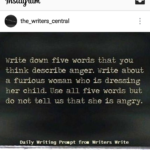 I’ve come away from the exercises with a lot more respect for writing prompts, but not the respect I was expecting.
I’ve come away from the exercises with a lot more respect for writing prompts, but not the respect I was expecting.
The biggest lessons I’ve learned boils down like to this: the writing prompts I tackle two days a week are allowing me to get words any way I can; they are allowing me to flex my writing muscles at what I would deem are inopportune times; they are forcing me to switch my brain into writer mode as quickly as possible; they are making me produce when I would otherwise be sitting on my phone looking at social media (read: wasting my time).
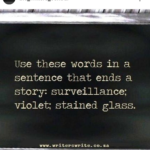 Like I said in my initial post, I’ve spent “years…only sitting in front of a blank page when I had something to write and not enough time spent sitting in front of said blank page needing to produce and coming up empty.” This has become a huge problem as far as my writing goes.
Like I said in my initial post, I’ve spent “years…only sitting in front of a blank page when I had something to write and not enough time spent sitting in front of said blank page needing to produce and coming up empty.” This has become a huge problem as far as my writing goes.
I’m one of those people who likes to block out specific time for tasks so that I have a big window in which to do lots and as few interruptions as possible. I also like to wait until everything is optimal: I’m well rested, prepared, my environment is neat, and I feel jonesed to get something done.
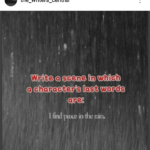 As any writer, any human really, can tell you, that formula is the perfect set up for failure, because 9 times out of 10 life doesn’t work out that way. Then there you are having done absolutely nothing. And here I am, it’s been months since I’ve opened my manuscript to work on it because everything hasn’t been just right for me to feel able to work on it.
As any writer, any human really, can tell you, that formula is the perfect set up for failure, because 9 times out of 10 life doesn’t work out that way. Then there you are having done absolutely nothing. And here I am, it’s been months since I’ve opened my manuscript to work on it because everything hasn’t been just right for me to feel able to work on it.
I’ve accomplished absolutely nothing because my brain can’t be bothered to switch to writing mode because I’ve trained it to only function when everything is perfect. Nothing is ever perfect. And this has really negatively affected my creative output. I’ve missed out on opportunities because I just can’t get in the zone.
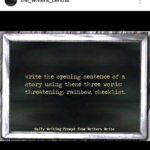 My major takeaways from my writing prompt exercises are that I can actually sit down for 10 to 15 minutes, look at my prompt, quickly brainstorm, and actually write something. Some days are really great and some days are really painful, but each Monday and each Wednesday I walk away having produced words, and that matters to me. Plus it’s a huge morale boost.
My major takeaways from my writing prompt exercises are that I can actually sit down for 10 to 15 minutes, look at my prompt, quickly brainstorm, and actually write something. Some days are really great and some days are really painful, but each Monday and each Wednesday I walk away having produced words, and that matters to me. Plus it’s a huge morale boost.
I used to think that using writing prompts would just lead to distractions from my main WIP and exhaust the little creative energy I had that could be put towards my WIP. Wrong! I’m learning to take the little pockets of time I have and apply them to writing instead of waiting to have time. And some of my writing prompts have even led me to think about aspects of my WIP’s protagonist that I never would have thought of.
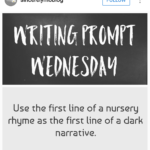 Others are just fun, and a fascinating insight into my psyche.
Others are just fun, and a fascinating insight into my psyche.
I am no longer disdainful of writing prompts, they’ve given me too much food for thought in the short amount of time I’ve been using them. I’m actually quite grateful at this point because I needed a kick in the butt like this.
I don’t intend to stop writing on my lunchbreaks, but I do hope to one day figure out h
ow to get my manuscript to work so that I can actually work on the story at hand. My lunch breaks are very short though, so that’s going to require some finagling.
Baby steps. At this point I’m just happy to be writing again. I hope you enjoyed my favourite writing prompts to date peppered throughout my post. Let me know if any inspire you!
The post Writing Prompts: A Follow-Up appeared first on Anxiety Ink.
August 23, 2016
Parkinson’s Law for Writers
While listening to the Science Fiction and Fantasy Marketing Podcast (and, yes, I realize I don’t have any SFF fiction written yet beyond the comic but I am a sucker for writing and publishing podcasts), Anna Hackett mentioned the concept of Parkinson’s Law. I hadn’t heard of it before. Some people I have talked to have but they couldn’t come up with the name for it from the description.
What is Parkinson’s Law
Ready? Here is Parkinson’s Law per Lifehack:
Parkinson’s Law – work expands to fill the time available for its completion – means that if you give yourself a week to complete a two hour task, then (psychologically speaking) the task will increase in complexity and become more daunting so as to fill that week. It may not even fill the extra time with more work, but just stress and tension about having to get it done.
While the podcast I listened to mentioned Parkinson’s Law in relation to the administrative side to publishing, my brain applied Parkinson’s law for writers.
Parkinson’s Law for Writers
The first step in writing–pre-writing–takes place in your head. You mull over world ideas, characters, plots, and tangle them all together to see if they will hold taut. Getting those ideas down onto paper (or computer) is a tough ask. Especially as you learn more skill ropes of the genre and need to think consciously about applying them.
When you have a story in you, it won’t get written to completion if you don’t have a deadline for it. That deadline, either set or anticipated, drives you. You can’t properly estimate the exact time a creative endeavour will take, but, Parkinson’s Law for writing comes down to this: without a deadline, your creative project will be endless.

I’ve often faced projects with a bunch of psychological weight–we all have here at Anxiety Ink (hence the anxiety :P). This happens in a lot of the different aspects: from the creation to the formatting to the administrative details.
If you don’t have the deadline for the project, you likely won’t see the end of it. And all that frustration and anxiety of having a half-born story inside of you will remain.
So get writing! That daunting anxiety won’t abate unless you get the words down.
The post Parkinson’s Law for Writers appeared first on Anxiety Ink.
August 21, 2016
Writing Retreats: Luxury and Necessity
Writing retreats are a luxury not all of us can afford – in the senses of both time and money. I don’t know about you, but I find that I get myself into bad routines. Breaking from those routines requires a disruption.
Confession: I’ve never been on a writing retreat. In college, I drove out to the local Panera to write for a couple hours. Writing dates like that are about the closest thing to a retreat that I’ve ever done.
Either that or family trips to the cottage my grandmother used to have, or a lakeside cabin. (That cabin was absolutely brilliant for writing, but that may have also been the family present.) However, those trips had their own priorities. Namely family, and we all know how that can get in the way of productive writing time.
This past weekend, I had a meeting with a few others from the theatre troupe I belong to (organizing the 24-hour New Play Festival, which I’m ridiculously excited about). I arrived at the Tim Horton’s about an hour before everyone else so I could sit down and get some writing done.
Wow, I needed that: a break from routine to recharge and get excited about writing again.
What I really need is a writing retreat, because I’m not going to permanently break these bad habits without tons of help. But that’s not going to happen any time soon.
The ironic part is that when I think “writing retreat,” I’m thinking quiet, relaxed, removed from the world, surrounded by nature. Which pretty much describes my house. (That photo above? Yeah, I live there. It’s pretty great.)
Seriously, it’s beautiful here. Sunday afternoon, I got to listen to and watch a pair of hawks just circling on the thermals overhead.
Because my bad habits are fairly ingrained in my routines – which center around my home – I can’t treat it as a retreat. However, that hasn’t stopped me from offering it to writer-friends! (In small doses. I am a more social creature than my husband and I respect his boundaries.)
I have a friend coming up Labor Day weekend. In between exploring Acadia National Park and my favorite summer fair, there will be writing. Lots and lots of writing.
Or so I hope. I’m optimistic that I’ll find the incentive I need to get more words on the page. But that’s just for myself. I also hope that she’ll be able to have the retreat she needs.
What do you envision when you hear about writing retreats? What would your ideal retreat look like?
The post Writing Retreats: Luxury and Necessity appeared first on Anxiety Ink.
August 18, 2016
Post-When Words Collide 2016
As I’m typing, it’s been roughly 22 hours since I left When Words Collide 2016. The end of the festival is always bittersweet because I love the energy and excitement about writing I get out of all of the presentations, but I also love that I get to go home and rest my tired brain after two and a half days of information inundation.
I walked out of the Delta South’s Atrium building with a million useful thoughts floating around my subconscious that I cannot wait to start implementing here and there. And after a soak in an epsom salt and grapefruit guava bubble bath and nearly 11 hours of sleep I feel ready to start making my move.
Without going into specific topic discussion, which I’ll be saving for later blog posts, I’ll cover a few things that are worth mentioning about this year’s WWC experience.
One, I learned something important about myself as a person this weekend following some interactions with people and one panel in particular: I very much need to retrain my brain out of the binary indoctrination it has gone through over the past 25 years. The panel I attended was called All the Colours: Authenticity and Sensitivity in Writing LGBTQ+ Characters. Aside from the excellent notes I walked away with about how to avoid the clichés inherent to LGBTQ+ characters and a better understanding of how such characters are currently represented in mainstream culture, I learned a lot about the basis of identity.
I’m not such an oaf that I think people can only be male or female, thankfully, I am an enlightened person of the 21st century. And while I am aware of pronoun use and the adoption of “they” as an identifier by some members of the LGBTQ+ community, I’ve never put the pronoun to use. After putting my foot in my mouth this weekend, I am doing my damnedest to retrain my brain so that I don’t insult people (again). I’m smart, I can rewire.
Two, after a conversation in the merchant room with a fellow writer friend I finally managed to bump into, I realized something else about myself: I’ve really grown as a writer! After being asked what types of panels I had been attending over the weekend and a brief moment of thought my answer was, “all the ones with topics that spoke to me that weren’t how-to’s on writing.” I realized in that moment that I felt confident enough in myself, knew enough about my writing and writing style, and what works for me that I didn’t need to attend those types of presentations anymore. That was a heck of a confidence boost! Her answer was the same, for the record.
Third, my favourite panel of the weekend had to be The Stage Can Help Your Page, mostly because Marty Chan is hilarious and I laughed the hardest and longest in his panel. I also walked away with some excellent playwriting tips that I fully intend to implement in my novel writing. I will admit that Writing About Fighting was a close second because of Sandra Wickham’s demos. I am so grateful I walked out of all the panels I attended with food for thought; they were all highly informative.
Finally, my least favourite moment of the weekend had to be Saturday morning. Not only did I leave my house late because I did not have myself properly organized the night before, I also forgot my lunch. This may seem like a no biggie to people, but understand this: in 17 years of school, in 9 years of working, I’ve forgotten my lunch twice. I have a certain attachment to food….I must have food with me. Even if I don’t end up eating it I need to know it’s there. If I forget my lunch, my day is inevitably ruined. It’s an anxiety thing.
I tried my best to be a mature adult about it, and although there was some intense ranting while I was driving and an unsuccessful scramble to get one of my parents to bring it to me, I did pretty good. I persevered, and the group lunch I went on that day turned into a giggle fest with a spurting hose and overly friendly bees.
Last weekend was exhausting in the best sense of the word. When Words Collide is always a humbling and inspiring event. Plus, I left with a light -yet awesome- haul this year!
The post Post-When Words Collide 2016 appeared first on Anxiety Ink.
August 16, 2016
Emotional Rollercoaster
A writer can spend their whole life worried about the quality of their work and hold it back within themselves. It ends up just making the writer a mass of frustration and anxiety, unable to share and worried about expressing themselves.
Conversely, you can share the creative portion of yourself. You can reach out and network with other people who are driven like you. You can pose challenges and face the those challenges together.
It’s been a emotional rollercoaster of a year for me.
In October 2015, I was very depressed. So much so that when December came around, holding conversations with people became difficult.
But I managed to digitally publish a comic that December.
And then I joined a group of comic makers.
Then I helped create an anthology to benefit a conference I love, Sirens Conference.
Then my wife became pregnant.
Then the comic got nominated for a national award.
Then I managed to get the comic printed, hand trimmed, and ready to move before a convention–a 100,000 people convention. We didn’t start small.
Then I managed to sell at the convention. And interact with people who…already knew the comic would mean something to them, just from the diverse premise alone. I heard stories that made me swell with pride. I heard stories that made me want to cry.
Then I could finally share the great news about my future child. Hitting that initial safety threshold was a weight off… in exchange for another of expectation, excitement, and unsolicited lectures.
Then I wrote a short story for the benefit anthology, one that I’m actually proud of.
Then I booked more conventions. More movement. More people caring about a little comic that could.
Then the comic got national media press coverage. Whhhhaaattt?!
Then the comic got accepted for more distribution reach online.
Then I learned more about formatting books and started working on formatting the anthology.
Then I did two panels in a row at When Words Collide and they went really well–lots of positive feedback, more than I have had with any other panel I have done!
Then…the Aurora Awards winners were announced.
We didn’t win. But the weight of all that had happened so far this year settled.
I am tired. Really tired. But not of creating. Quite the contrary, I am really energized to continue getting to work, creating, formatting, moving creative work out there. But I am conference exhausted. I feel over-peopled. I am a bone-tired introvert who needs to pull back and start saving up my strength again.
But I am excited to create more, save up my strength before Sirens Conference in October, and then be ready to become a mom in November.
Featured image: Source
The post Emotional Rollercoaster appeared first on Anxiety Ink.
Anxiety Ink
- Kate Larking's profile
- 53 followers



